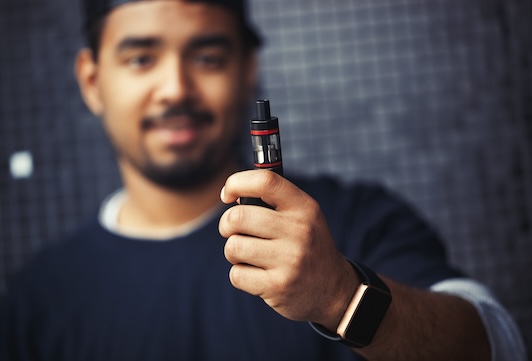E-cigarettes, commonly known as vapes, contain nicotine and various chemicals, including some used for flavourings, which make them more attractive to young people. Despite measures to protect youth, such as age restrictions and flavour bans, all types of vaping products remain easily available online. As a result, Canada has one of the highest youth vaping rates in the world.
In response to the urgent need to understand the long-term health effects of vaping, researchers at the Research Institute of the McGill University Health Centre (RI-MUHC), in collaboration with colleagues at the Lady Davis Institute for Medical Research (LDI), have studied vaping products popular with teenagers and examined their effects in the laboratory. The researchers used mouse models that reflect the types of diseases humans develop over a lifetime and exposed these models to e-cigarette aerosols for different periods. Their findings provide evidence that vaping at a young age may increase the risk of heart disease later in life, especially in men.
The first study, published in BMJ Open Respiratory Research, shows that vaping a popular brand of e-cigarette even for a short time causes significant changes in the lungs that affect important biological pathways, which are a series of molecular events that are necessary for the body to function properly.
“In this study, we observed modifications in metabolism, detoxification and lipid signaling pathways, some of which are associated with the development of heart disease. Thus, we conducted another study, where we saw the development of atherosclerosis, a condition that can cause heart attacks,” says Carolyn Baglole, PhD, a Scientist in the Translational Research in Respiratory Diseases Program at the RI-MUHC and a senior author of both studies.
Indeed, the findings of the second study, published in the journal Toxicology and Applied Pharmacology, showed that, although the e-cigarette aerosols produced minimal inflammation in the lungs and throughout the body, long-term daily exposure to tobacco-flavoured vape products caused an increase in circulating levels of lipids (fats) and a build-up of plaque in the heart and blood vessels—a phenomenon called atherosclerosis.
“These are important findings as they suggest that vaping could increase your risk of cardiovascular problems like heart attack or stroke, says Koren Mann, PhD, a Senior Scientist at the LDI, Chair of the Pharmacology and Therapeutics Department at McGill, and the other senior author on these studies.
“In both studies, the changes to the lungs and heart were prominently seen in males, which suggests that vaping could disproportionally impact men. This raises significant concerns for the future health of young men who currently vape,” adds Prof. Baglole, who is also an Associate Professor in the Department of Medicine at McGill University and the Director of the McGill Research Centre for Cannabis.
Important negative effects
In these studies, the researchers used high-throughput analysis (i.e., large-scale experiments that allow for testing of a large number of compounds) on vaping products that are legal in Quebec and Canada. They examined how the chemicals in these products affect the lungs, using daily exposure levels and patterns that mimic typical adolescent usage.
“E-cigarettes are sometimes perceived as harmless because of comparisons to tobacco smoke, which we know causes many diseases. E-cigarettes are different than tobacco, in part because e-cigarettes don’t cause much inflammation. For this reason, we didn’t set out to compare smoking tobacco with vaping, but rather, we searched for unknown effects of vaping that are not necessarily associated with smoking,” Prof. Baglole explains.
“As expected, in our experiments, vaping did not cause lung inflammation, but it did have other important negative effects, including changes to processes deep within the lungs that may impact disease risk in a different way,” says Vincenza Caruana, the first author of the second study, who is a Ph.D. student at the RI-MUHC, co-supervised by Prof. Baglole and Prof. Mann.
More research is needed to understand why males are more affected by e-cigarette aerosols. Given the rapidly changing landscape of the e-cigarette market and the addictive nature of vaping products, the authors of the studies also highlight the need to further study popular products such as disposable vapes and oral nicotine pouches, as well as cannabis-based vaping products, which are also popular among teens and young adults.
“Due to their recent emergence, we lack data on the risks associated with vaping. Their dazzling popularity among young people should prompt us to investigate their long-term effects, and this is what we will continue to do,” says Prof. Baglole.
About the studies
The study Sex-specific alterations in pulmonary metabolic, xenobiotic and lipid signalling pathways after e-cigarette aerosol exposure during adolescence in mice is co-authored by Sofia Paoli, David H. Eidelman, Koren K. Mann and Carolyn J. Baglole.
This work was supported by the Quebec Respiratory Health Research Network (QRHN) and the Canadian Institutes for Health Research.
The study Chronic exposure to E-cigarette aerosols potentiates atherosclerosis in a sex-dependent manner is co-authored by Vincenza Caruana, Braeden H. Giles, Nikola Kukolj, Roni Juran, Carolyn J. Baglole and Koren K. Mann.
This work was supported by the Canadian Institutes for Health Research.
The authors would like to thank the McGill University Health Centre Foundation and all the donors who made possible the purchase of specialized equipment needed for vaping research.


